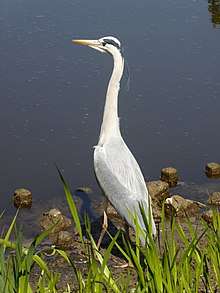ardea
See also: Ardea
Latin
Etymology
From a Proto-Indo-European root and common to Ancient Greek ἐρῳδιός (erōidiós, “heron”) and Serbo-Croatian róda (“stork”)[1].
Inflection
First declension.
| Case | Singular | Plural |
|---|---|---|
| Nominative | ardea | ardeae |
| Genitive | ardeae | ardeārum |
| Dative | ardeae | ardeīs |
| Accusative | ardeam | ardeās |
| Ablative | ardeā | ardeīs |
| Vocative | ardea | ardeae |
Derived terms
- ardeola
References
- ardea in Charlton T. Lewis and Charles Short (1879) A Latin Dictionary, Oxford: Clarendon Press
- ardea in Charlton T. Lewis (1891) An Elementary Latin Dictionary, New York: Harper & Brothers
- ardea in Gaffiot, Félix (1934) Dictionnaire Illustré Latin-Français, Hachette
- ardea in Harry Thurston Peck, editor (1898) Harper's Dictionary of Classical Antiquities, New York: Harper & Brothers
- ardea in William Smith, editor (1854, 1857) A Dictionary of Greek and Roman Geography, volume 1 & 2, London: Walton and Maberly
- ardea in Richard Stillwell et al., editor (1976) The Princeton Encyclopedia of Classical Sites, Princeton, N.J.: Princeton University Press
- Pokorny, Julius (1959), “arōd-”, in Indogermanisches etymologisches Wörterbuch [Indo-European Etymological Dictionary] (in German), volume I, Bern, München: Francke Verlag, pages 68-69
This article is issued from
Wiktionary.
The text is licensed under Creative
Commons - Attribution - Sharealike.
Additional terms may apply for the media files.
